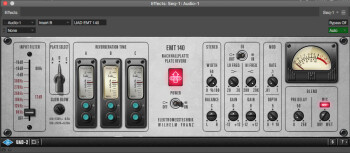As we continue looking at the different reverb families, we'll focus this time on plate and hall reverbs.
What’s on your plate?
Plate reverbs entered the market in the late 1950s with the famous EMT 140. Their operating principle is very similar to that of spring reverbs, except that this time around, as the name implies, sound travels across a metallic plate. However, the sonic result is much more complex and. in a way, more realistic. Its sound is characteristic enough to represent a specific era. In fact, there are probably not many recordings from the '60s and '70s that don’t have the imprint of a plate reverb.
Typically, plates are used on vocals due to their “musicality” (for lack of a better term), which provides vocal tracks with extra vitality. Snare drums are another favorite of this type of reverb. With a short enough decay time so as not to “pollute” the rhythm, a plate can be the perfect match for a snare, adding some bite and highlighting its depth. Along the same lines, brass instruments are also very fond of plate reverbs. Finally, synthetic pad sounds can also benefit from this type of effect.
Do note, however, that just like spring reverbs, plates aren’t meant to be discreet. Hence, they are often used as an effect, rather than to create a sensation of space ─ although a plate together with a tape delay can produce a usable result, however “outdated” it may sound. And it’s also important to know that, due to its nature, this type of reverb has a tendency to sound “metallic.” So don’t hesitate to EQ the reverb’s output signal if its too annoying.
Hall or nothing
The goal of hall reverbs is to try to replicate the sound of classic concert halls. Generally speaking, this translates into relatively long reverbs with a slow reflection build-up, a solid low end and a less-obvious separation of early reflections and diffused sound field. In terms of sensations, it sounds rich, spacious, deep, warm, realistic, etc.
This type of reverb will obviously make the delights of string, wood and brass arrangements, for instance. In short, any more or less classical instrument will benefit from a hall. Vocals might also benefit from the bombastic immensity of a hall, especially on down-tempo songs where the long reverb can artfully fill up empty spaces. On the other hand, I wouldn’t recommend using a hall reverb on percussion instruments. In fact, sharp transients don’t get along too well with such algorithms, not to mention the increase of energy in the lows, which will blur everything pretty easily. However, in small amounts and with a mindful EQing of the low end, a hall can add a subtle sense of depth to your mix. But you have to be careful and use it very subtly, the reverb ought to be felt rather than heard.
Next week I’ll tackle chamber and ambient reverbs.

